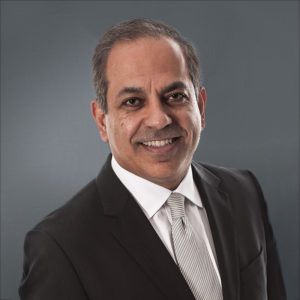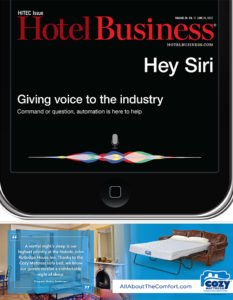 In a career sea change, Joseph (Joe) S. Khairallah in 2013 made a major move, seguing from a 30-year stretch at Hyatt Hotels & Resorts to Wisconsin-based Marcus Hotels & Resorts, where he served as COO. He was then named president/COO of the company in October 2016.
In a career sea change, Joseph (Joe) S. Khairallah in 2013 made a major move, seguing from a 30-year stretch at Hyatt Hotels & Resorts to Wisconsin-based Marcus Hotels & Resorts, where he served as COO. He was then named president/COO of the company in October 2016.
Parlaying a CV that includes extensive experience managing business operations across six continents, the executive’s operational approach focuses on engaging employees at all levels, improving profitability and providing “exceptional” customer experiences. At Marcus Hotels, Khairallah has aligned efforts on customer-impacting initiatives and garnered support for large investments in infrastructure and new technology deployments.
Khairallah, who speaks six languages, grew up in Lebanon and acquired a hotel management degree from Institut Haulot in Brussels.
He serves on the national board of the American Hotel & Lodging Association, Hilton Hotels’ Full Service Advisory Board, and Oklahoma State University’s School of Hotel & Restaurant advisory board, and is vice chair and board member of Visit Milwaukee.
What is your vision for the company in terms of industry position and growth? Our vision and the reason we exist at Marcus Hotels & Resorts is to serve people, create memories and deliver exceptional experiences. The people we serve include our guests, business partners, hotel ownership, associates and the communities in which we operate.
Our industry position is to be an “experience company in an experience economy.” We are a national hotel management company that delivers bottom-line results. Our ability to deliver excellent returns for our owners and partners, combined with our strength in food & beverage, help us continue to grow and succeed.
What sort of headwinds and/or tailwinds have you encountered in propelling Marcus Hotels forward? The positive economic conditions have certainly created a tailwind for our industry. CBRE reports U.S. lodging demand has now grown for 29 consecutive quarters, leading to record occupancy levels. The headwinds have come from an influx of competition in selected markets. This increased competition has made us more creative in securing new business and attracting talented associates.
As an industry veteran, you have depth of knowledge regarding the global hospitality outlook. What do you see as challenges to being in the hotel business in 2017 and beyond? The first and largest challenge facing our industry will be labor. According to the U.S. Bureau of Labor Statistics, the hospitality industry will offer 328 million jobs by 2022, which will account for 10% of the U.S. workforce. This is nearly a 50% increase in jobs compared to 2013. With unemployment already low, it will be more difficult to find the skilled and experienced talent we need. The challenge for us is finding associates with a spirit to serve and a desire to create memories for our guests.
I also believe that globalization will ultimately touch all aspects of the hotel industry. From a global perspective, hotel industry revenues were $550 billion in 2016. With more than 700,000 hotels and resorts around the globe and a total of 15.5 million rooms available, the flow of travelers across borders must be facilitated. To thrive, leaders will need to think globally. We are in a global market, which means that inbound tourism will continue to be essential to our success.
What do you see as key in delivering a quality and, at the same time, unique guest experience? For generations, our mantra at Marcus Hotels & Resorts has been to make what is an ordinary day for us an extraordinary day for our guests. Examples include our outstanding food & beverage offerings and unique programming, such as our award-winning Artist-in-Residence program at three of our hotel properties. At one of our Hilton hotels, we even have a mini Goldendoodle “concierge,” who touches the hearts of locals and travelers alike.
Providing these unique experiences brings personality and life to a property and endears it to its community. It turns the hotel into a business that is engaged with both the community and its guests—a place where people really care.
You are known as a proponent of “the human element” in hospitality, yet today’s industry focus seems to be on automation, speed and greater amounts of technology. Is there room for both? Yes, absolutely. It is essential to combine today’s technology advancements with the human element in hospitality. While technology helps us provide needed efficiencies, delivering a personalized travel experience and service from the heart is what can ultimately define a stay. Studies indicate that what matters most to consumers is the emotional impact of their interactions with front-line employees. This is where the human touch makes the difference. Buildings are just brick and mortar. It is people who bring them to life by welcoming guests with a friendly smile and a show of empathy and care. Thus, it is important to combine the latest innovations with the personal touches that help create memorable experiences.
How do you see balancing high tech with high touch to benefit both the hotelier and the guest? There is no question that technology has improved the operations side of the business, enabling us to be more efficient and allowing us to better communicate with our guests. Today, more than 50% of hotel bookings take place online. Interactive websites with chat features, digital marketing and social media are primary tools consumers use to research hotels and restaurants and provide real-time feedback. But nothing will replace the human touch. Our business is to create memories and our duty is to make those memories the best they can be. The balance of high tech and high touch can be seen with millennials, who quickly adopt the latest technology but also crave an ultra-personalized experience. While guests enjoy using the newest hotel app, what they remember most is the memory of their experience.
Labor always has been an industry issue. Layer on a generational workforce used to viewing their lives through their phones and one wonders if it is hard to train today’s associates? Everyone needs a purpose in life and as long as we hire the right individuals who are motivated to serve and help them find their true north, then success is within reach.
You have decades of experience in the lodging industry. Is there anything you wish would make a comeback? As hoteliers, it is important for us to continue to remember the fine “art of service.” This industry goes beyond being transactional and to excel, we need to provide a personalized service where attention to details really matters. We seem to be migrating from the hotel business into the business of hotels. The real estate part is very important and so is the return on investment; however, I would like to see a much stronger emphasis on service and details.
How is Marcus Hotels & Resorts making it all work so that it’s a so-called “friction-free” company? To win in the competitive marketplace, we need to be the company that is easy to work with in all areas. Our digital experience needs to be easy for consumers, regardless of age and technical skills. Our in-room and property experiences need to be easy, too. We look at all areas of the business from the viewpoint of our guest. Our philosophy is we cannot expect people to take extra time and effort to use our services; everything we do needs to be smooth, seamless and easy for the people we serve.
Since becoming president of Marcus Hotels & Resorts, has anything surprised you? After speaking at several major universities this year, I continue to be surprised and impressed with the number of bright and ambitious young hospitality professionals from all countries entering the industry. Many of these individuals have a positive combination of digital skills, interest and eagerness to grow and prosper in our business.
What’s your level of optimism for the industry heading into 2018, and in particular, for what Marcus Hotels does? For the industry, experiential consumer spending keeps showing strength and despite the supply growth in most markets, I believe that we will continue to have a smooth sailing. As supply growth increases, I expect to see pressure on pricing.
For Marcus Hotels & Resorts, we remain optimistic that our commitment to authenticity, personalization and service will drive consumer demand at our properties. While delivering strong returns, we will continue to invest in our hotels, in our valued partnerships and in our people. HB

